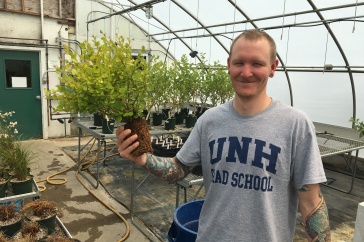
USA sled hockey team member Noah Grove '21 will compete in the Winter Paralympics in PyeongChang, South Korea, in March.?
The fact that Noah Grove '21 had cancer when he was a kid is part of his story in the way that any significant event can shape one’s future. It’s likely why he’s majoring in biomedical science and plans to become an orthopedic oncologist. And it’s definitely how he found his way to sled hockey, a full contact sport played on the ice while sitting on a sled.
But making the U.S. National Sled Hockey Team that’s headed to the Winter Paralympics in South Korea in March isn’t about childhood cancer. It’s about grit and determination and stamina. Sled hockey is tough. It’s physical and requires speed and strength.?
Grove came to UNH because it has “lots of opportunities,” he says, citing as an example the university’s reputation for helping students secure internships. Northeast Passage was also draw; Grove knew of the program for disabled athletes and that he could train there.?"UNH provides me with the best environment to balance my academics, sports?and other aspects of my life," he says.?
“Obviously this is quite a journey.”
Since school started in September, Grove, a Maryland native, has only been able to be on campus for the weekend three times. Practices with the USA team are nearly all-consuming; this is his third season with the national development team. Additionally, there are tournaments. In November, Grove traveled to Minnesota for the USA Sled Hockey Classic, presented by the National Hockey League and drawing more than 300 competitors. The team has also faced off against Korea, Japan and Canada.
What’s more, Grove has spent a part of his last four summers attending sled hockey select training camps where some of the top disabled sled hockey players in the sport have been identified.
“The best players are at those camps; it’s a way to get noticed. That’s how I was picked for the development team,” Grove says. “It’s helped me set goals for myself — milestones that would be great to hit.”

Noah Grove '21. Follow Noah on?
Twitter @ncgrove_16 ?
Sled hockey is played on a modified sled frame that has ice hockey blades attached to the bottom, allowing the puck to pass underneath. Instead of one hockey stick, there are two. As with nondisabled teams, there are five skaters and a goalie. Grove plays forward.
“Obviously this is quite a journey,” Grove says of the path to the Paralympic Games. “I can’t even imagine what it would be like — the opening ceremonies and walking out of the tunnel with your country’s flag. Having that pride.”
In addition to team practices and tournament play that is ongoing, Grove also manages to work out six to seven times a week. Add in his studies and there isn’t a lot of slack.
“It’s all about time management,” he says. “I think I’m getting better at the process. I would like to be playing hockey as long as possible before I start my career, so it’s good to get a handle on balancing things now.”
He calls having surgery — his left leg was amputated when he was five — and going through chemotherapy “a long road” that he feels fortunate to have traveled when he did.
“I think it would be hard now, to go through that at this age,” he says. “I’m lucky it happened when it did.”
Lucky. Not the word everyone would use. But Grove never let cancer slow him down. He started playing soccer on his new leg when he was 8 years old and continued to add other sports throughout his school years: baseball, basketball, golf. ?At 15 he became the youngest player on the U.S. National Men’s Amputee Soccer Team.
“The hardest part for me about playing at this level is overcoming the mistakes I make during a game,” Grove says of his sled hockey performances. “It’s one of the biggest things I’ve been working on while I’m on the ice. Someone said to me, ‘You have bad plays not bad games.’ I try to remember that.”
The 2018 Paralympic Winter Games take place in PyeongChang March 8 –18.
-
Written By:
Jody Record ’95 | Communications and Public Affairs | jody.record@unh.edu




















































